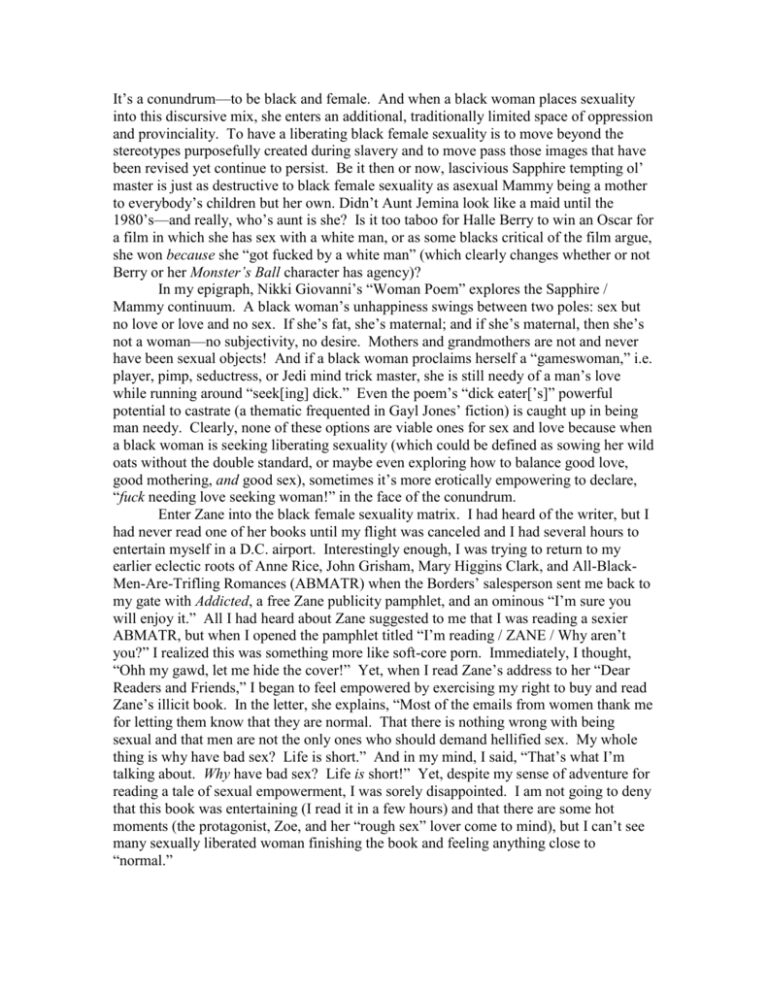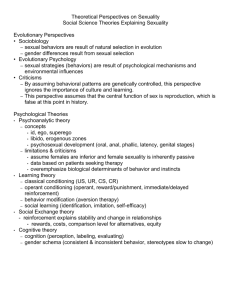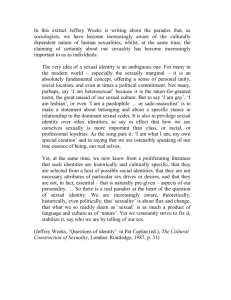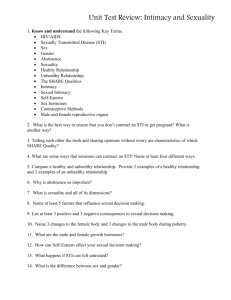
It’s a conundrum—to be black and female. And when a black woman places sexuality
into this discursive mix, she enters an additional, traditionally limited space of oppression
and provinciality. To have a liberating black female sexuality is to move beyond the
stereotypes purposefully created during slavery and to move pass those images that have
been revised yet continue to persist. Be it then or now, lascivious Sapphire tempting ol’
master is just as destructive to black female sexuality as asexual Mammy being a mother
to everybody’s children but her own. Didn’t Aunt Jemina look like a maid until the
1980’s—and really, who’s aunt is she? Is it too taboo for Halle Berry to win an Oscar for
a film in which she has sex with a white man, or as some blacks critical of the film argue,
she won because she “got fucked by a white man” (which clearly changes whether or not
Berry or her Monster’s Ball character has agency)?
In my epigraph, Nikki Giovanni’s “Woman Poem” explores the Sapphire /
Mammy continuum. A black woman’s unhappiness swings between two poles: sex but
no love or love and no sex. If she’s fat, she’s maternal; and if she’s maternal, then she’s
not a woman—no subjectivity, no desire. Mothers and grandmothers are not and never
have been sexual objects! And if a black woman proclaims herself a “gameswoman,” i.e.
player, pimp, seductress, or Jedi mind trick master, she is still needy of a man’s love
while running around “seek[ing] dick.” Even the poem’s “dick eater[’s]” powerful
potential to castrate (a thematic frequented in Gayl Jones’ fiction) is caught up in being
man needy. Clearly, none of these options are viable ones for sex and love because when
a black woman is seeking liberating sexuality (which could be defined as sowing her wild
oats without the double standard, or maybe even exploring how to balance good love,
good mothering, and good sex), sometimes it’s more erotically empowering to declare,
“fuck needing love seeking woman!” in the face of the conundrum.
Enter Zane into the black female sexuality matrix. I had heard of the writer, but I
had never read one of her books until my flight was canceled and I had several hours to
entertain myself in a D.C. airport. Interestingly enough, I was trying to return to my
earlier eclectic roots of Anne Rice, John Grisham, Mary Higgins Clark, and All-BlackMen-Are-Trifling Romances (ABMATR) when the Borders’ salesperson sent me back to
my gate with Addicted, a free Zane publicity pamphlet, and an ominous “I’m sure you
will enjoy it.” All I had heard about Zane suggested to me that I was reading a sexier
ABMATR, but when I opened the pamphlet titled “I’m reading / ZANE / Why aren’t
you?” I realized this was something more like soft-core porn. Immediately, I thought,
“Ohh my gawd, let me hide the cover!” Yet, when I read Zane’s address to her “Dear
Readers and Friends,” I began to feel empowered by exercising my right to buy and read
Zane’s illicit book. In the letter, she explains, “Most of the emails from women thank me
for letting them know that they are normal. That there is nothing wrong with being
sexual and that men are not the only ones who should demand hellified sex. My whole
thing is why have bad sex? Life is short.” And in my mind, I said, “That’s what I’m
talking about. Why have bad sex? Life is short!” Yet, despite my sense of adventure for
reading a tale of sexual empowerment, I was sorely disappointed. I am not going to deny
that this book was entertaining (I read it in a few hours) and that there are some hot
moments (the protagonist, Zoe, and her “rough sex” lover come to mind), but I can’t see
many sexually liberated woman finishing the book and feeling anything close to
“normal.”
The simple plot of Addicted is as follows (if you don’t want me to ruin it for you,
stop reading now): woman is sexually bored with husband, woman has hot steamy
affairs, woman almost loses husband, woman recommits to marriage, woman has hot
steamy sex with husband. Now, the more complicated (and problematic) plot is as
follows: woman is sexually bored with husband, woman has hot steamy affairs, woman
seeks counseling for sex addiction, woman almost loses husband, through hypnosis
woman realizes she has childhood sexual trauma, by finally communicating with her
husband woman realizes husband has past sexual trauma, thus concluding both have
sexual issues, both commit to counseling and recommit to the marriage, and then they
have steamy hot sex after woman’s past lovers attempt to kill her. No, I am not making
this up.
Let’s be clear: I believe in marriage; I do not advocate adultery; I do not dismiss
counseling; I do not belittle people’s addictions (yes, I think you can have a sexual
addition, and, yes, we should talk about mental health more in the black community); and
I do not make light of sexual traumas be it man, woman, or child. However, what I find
problematic about Addicted is its circulating guise among readers as a liberating jaunt
through black female sexuality when it really is a cautionary moral tale of black woman’s
sexual pathology. This is not a how-to for “hellified sex,” it’s a WWF smackdown on
black women’s desire for sex.
Unfortunately, Zoe is caught in the conundrum: either she remains committed to
her perfect yet sexless middle class marriage or she gets sexually satisfied through a
string of promiscuous extramarital affairs. To add insult to injury, her husband, Jason, is
an ideal Prince Charming. He and Zoe fall in love in childhood, he wants to wait until
they’re married to have sex, and he marries Zoe when she gets pregnant during high
school. Despite their sweet relationship, there are signs that things are not right. Not
only does the novel begin with Zoe talking to her therapist, but during her recollections,
Zoe admits that she started masturbating at a very early age and, in a gender role reversal,
she continuously pressures Jason for sex. For Zoe, her sexual aggressiveness in youth,
her compulsive masturbation, and her affairs are evidence of her sexual addition.
Yet, the troubled wife’s confessions to her therapist are problematically
characterized as much as her therapist’s own sexual voyeurism as Zoe seeking help for
her addiction to exploring her desires. And if the therapist is a voyeur, what are we dear
readers? As much as I liked Jason, my mind was still framed by Zane’s own question:
why have bad sex? Unlike Jason, who is traditional and lacking sexual intimacy, Zoe has
the sex of her fantasies with her passionate painter, her young mechanic, and her
experimental female lover. In spite of this, Zoe is trapped by asexual, “cult of true
womanhood” expectations of what it means to be a wife and mother just as she is limited
by her unsuccessful exploits as a “gameswoman.” Where is the sexual empowerment?
Zoe is as bound and disciplined in her affairs as much as she is in her marriage. Forget
“normal”; whether it’s loving, exploratory, sensual, kinky, or freaky, all the sex in
Addicted is bad sex.
Within the very escapades that are supposed to free Zoe—and vicariously her
audience—the struggle for a liberating, fulfilling black female sexuality becomes
restricted, oppressed, and, ultimately, punished. For instance, even though her female
lover is the most stereotypical representation of Zoe’s scandalous exploration, the story
never details these encounters and leaves the identity of Zoe’s last lover as one of the
many plot twists. In response to the female lover’s biting comments about their sexual
interactions, Zoe adamantly claims, “I never asked you to do that either! You insisted,
and it’s not like I returned the favor!”(280). Zoe explains, it doesn’t matter who did
what, as long as she is getting some and not giving it: i.e. I’m not a lesbian, I’M NOT!
Problematically, Zoe’s lesbian sexual encounters are supposedly the ultimate sign of her
addiction, but what Addicted really does is box in black female sexuality by associating
lesbianism with Zoe’s sexual pathology. Nonetheless, all Zoe’s affairs are pathological.
Her lesbian lover tries to smother her, her young mechanic is an ex-con who tries to
choke her, and her passionate painter is a serial killer. Repeated attempts on one’s life
are clearly an appropriate punishment for exploring black female sexuality!
The novel’s pathologizing of black female sexuality comes as a double-edged
sword. Not only are Zoe’s lovers forbidden because she’s married and they’re all crazy,
but her sexual desire has been problematic from the start. With the help of a male
specialist in sexual addition (because the black female therapist is both voyeur and
inexperienced), Zoe discovers that she emotionally buried two childhood sexual traumas.
In addition, Jason contributes to Zoe’s trauma with his own sexual dysfunction caused by
witnessing his mother have sex with her johns. Due to the lack of a true exploration and
an opening of the matrix of black female sexuality in the novel, Jason’s conservative
ideals about sex are not so much depicted as a product of the confining images of black
female sexuality (for him, his wife and the mother of his children must be kept in line by
“all-your-friends-are-sluts” speeches) but his justified shame of his promiscuous,
unredeemable mother (167). In every twist of the plot, the latent textual message returns
to the idea that black female sexuality is wrong, bad, dirty, downright pathological, and
punishable by death. Zoe’s single best friend, the woman in the novel who should be
having good sex, is killed by her abusive boyfriend—who, of course, also attempts to kill
Zoe. The saddest affirmation of the novel’s abuse is when Zoe, realizing that Jason is
going to leave her, walks into oncoming traffic saying, “This one’s for you Boo!” (240).
At this point, I was uncomfortably laughing at this new plot twist because I was amazed
at how Zoe/Zane just upped the ante to an impossible cost for black women and their
sexuality—life and no sex, or sex and no life. Despite the novel’s intended blissful
ending of marital reconciliation and counseling, black female sexuality was ultimately,
again, “tied up to unhappiness” for me, and the only closure I could find as a reader was
to conjure Giovanni’s poem and chant “fuck needing love seeking woman.”
Admittedly, Zane has made a big accomplishment in popular fiction. The New
York Times details how the writer started by circulating an erotic story via email,
launched a website, published her book, and now she has her own publishing company,
providing opportunities for other young black writers (Ginia Bellafante, “A Writer of
Erotica Allows a Peek at Herself,” 22 Aug. 2004). Bellafante identifies Zane’s appeal as
the writer’s “aversion to presenting an unmitigated fantasy of sex-without-consequence.”
Hmmm…I cannot admonish a housewife turned author for being successful in tapping
into black women’s sexual fantasies. I can, however, question the sexual capital attached
to the novel in context of the readers’ need for fatal consequences. When has black
female sexuality never been about consequences? And I can identify this book as being
less erotically empowering or sexually freeing than a bad porn flick in its distortion of
liberating demands for “hellified sex” and its paradoxical affirmation that “normal” black
female sexuality is pathological. The only thing provocative about Addicted is the
explicit language in which it describes Zoe’s exploits: a proliferation of d, p, c, and fwords that make the sexually conservative blush in their bluntness. Yet, if those words
cannot move black female sexuality beyond simple sex objects, fat and black bodies,
mothers, grandmothers, gameswoman, love needers, man seekers, and dick eaters (and in
case your wondering, I don’t believe they can), then black female sexuality is just trauma
and pathology. And there’s no agency in that.
Ayesha K. Hardison is a lover of literature and a doctoral student at the University of
Michigan. In her free time, she occasionally likes to indulge herself in “bad” popular
culture: fiction like ABMATR, independent/low budget films, and rap, R&B, and pop
music.









